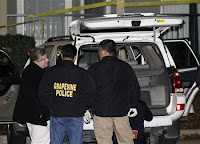 Washington is starting to dig deep in a $2.6 billion underground solution aimed at helping clean up the polluted Potomac River and the ailing Chesapeake Bay, the biggest U.S. estuary.
Washington is starting to dig deep in a $2.6 billion underground solution aimed at helping clean up the polluted Potomac River and the ailing Chesapeake Bay, the biggest U.S. estuary.In the U.S. capital's biggest public works project in more than 40 years, work started this fall to cut about 16 miles of tunnels to keep overflow sewage and stormwater from running into the Potomac.
The project, designed to be finished in 2025, is seen by environmentalists as part of resolving the next great water pollution challenge facing the United States -- keeping fouled runoff out of lakes, streams and rivers.
The vast dig "is a dramatic piece of the puzzle to improve the water quality in the Potomac," said Carlton Ray, head of the District of Columbia's Clean Water Project.
For the 15 million tourists who visit Washington each year, the broad Potomac serves as a dramatic backdrop to the city's gleaming monuments and public buildings, like the Capitol and the Lincoln Memorial.
But the smoothly flowing waters of what admirers call "the nation's river" hide deep problems.
The Potomac carries so much sex-changing pollutants that male bass have been found carrying eggs. Swimming is banned after heavy rains because of polluted runoff.
Locals are warned about eating the Potomac's fish because of contamination from polychlorinated biphenyls, a likely carcinogen in humans.
The river and its almost 15,000-square-mile basin is the top source of sediments dumped into the Chesapeake Bay, a leading U.S. crab fishery and itself struggling to revive from decades of overfishing and pollution.
REPORT CARD: D
In its report card this year, the Potomac Conservancy, an environmental group, graded the Potomac at "D." It cited poor land use practices, new contaminants and continuing fights to control pollution.
"If we can't figure out how to clean up and be able to swim in a river and eat the fish you catch, if you can't do that in the nation's capital, what hope do we have?" asked Hedrick Belin, the Potomac Conservancy's president.
Washington's sewers project, which will use a tunneling machine the length of a football field, is aimed at eliminating 96 percent of one of the biggest sources of Potomac pollution -- stormwater from the District of Columbia.
About one-third of Washington, including the White House and the Capitol, is hooked up to a 19th century sewer system that carries both sewage and stormwater into the Potomac and its District of Columbia tributaries, the Anacostia River and Rock Creek.
About 2.5 billion gallons of raw sewage mixed with rainwater is swept into the river each year when Washington's sewers back up from heavy rain, fouling the river.
"Basically, anytime it rains we have overflow events," said Ray, the project's chief.
The new project, set up under a 2005 federal consent decree, is designed to hold millions of gallons of runoff until it can be pumped out and treated.
Part of the cost of the dig, Washington's biggest public works project since the building of its subway, will be defrayed by the District's impervious surfaces tax. The levy taxes surfaces that feed runoff and was doubled in October.
The passage of the 1972 Clean Water Act helped shut off much of U.S. pollution from single sources, like factories. The biggest culprit now is water sheeting off roads, farms, houses and urban areas that sweeps waste into lakes, rivers and streams, environmentalists said.
FOUL RUNOFF
"Most of the pollution is not coming out of a big pipe, a big plant. It is coming from water flowing off surfaces," said the Potomac Conservancy's Belin.
Tim Guilfoile, deputy director of the Sierra Club's Water Sentinels program, estimated about 60 percent of U.S. water pollution comes from runoff mixed with manure, pet waste, fertilizers, oil, chemicals and trash.
The problem is especially acute in areas like Washington and its sprawling suburbs, where development has stripped land cover and replaced it with surfaces like houses, parking lots and roads that feed runoff.
For example, Prince George's County, which borders the District of Columbia, lost half its forest cover from 1993 to 2007, the Potomac Conservancy said.
One inch of rain can produce from 1,000 to 1,500 gallons of runoff from a 1,500-square-foot roof, Guilfoile said.
"The only way we can have an impact (in controlling pollution) is to change how we handle stormwater," he said.
The Environmental Protection Agency (EPA) required the District of Columbia in October to take a raft of steps to cut runoff further. They include roof gardens, planting trees, refitting drainage and that 1.2 inches of rain be retained on a development's site in a 24-hour storm.
Ray, the tunnel project's director, said the District of Columbia was in talks with the EPA about building swales, or marshy troughs filled with vegetation, and other green structures to hold runoff, and cut the dig's price tag.
"If we can show it's successful, we can spend millions and millions of dollars on green infrastructure and reduce the gray infrastructure" of the concrete tunnels, he said.





